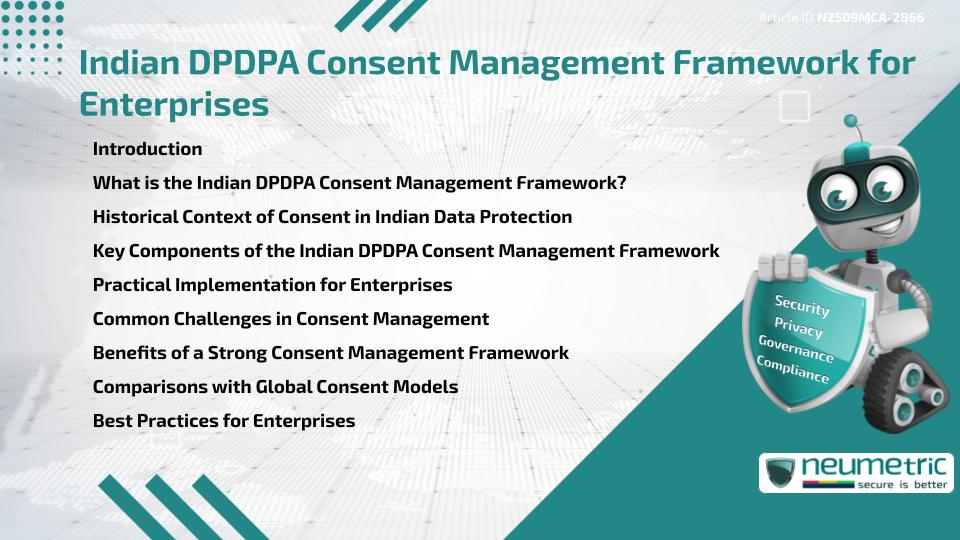Table of Contents
ToggleIntroduction
The Indian DPDPA Consent Management Framework establishes how Enterprises must Obtain, Record & manage User Consent for data processing. Consent is central to the Digital Personal Data Protection Act [DPDPA], ensuring individuals retain control over their Personal Information. For Enterprises, implementing this Framework is not just a Compliance requirement but also an opportunity to build Trust with Customers. This article explores the Framework’s history, components, challenges & Best Practices for Enterprises.
What is the Indian DPDPA Consent Management Framework?
The Indian DPDPA Consent Management Framework defines the legal & operational rules Enterprises must follow when processing Personal Data. It requires Consent to be free, specific, informed, unconditional & revocable. This Framework ensures that individuals clearly understand what data is collected, how it will be used & their rights to withdraw Consent. Enterprises must establish systems that document & respect these preferences at all times.
Historical Context of Consent in Indian Data Protection
The emphasis on Consent in Indian Data Protection law grew after the 2017 Supreme Court ruling that recognised Privacy as a fundamental right. Subsequent drafts of the Data Protection law consistently prioritised User Consent as the foundation of Personal Data processing. With the DPDPA’s passage in 2023, the Indian DPDPA Consent Management Framework became formalised, reflecting Global Standards like the European Union’s GDPR.
Key Components of the Indian DPDPA Consent Management Framework
The Framework consists of several critical components:
- Informed Consent: Users must be provided with clear information on data use.
- Granularity: Consent must be purpose-specific rather than bundled.
- Revocability: Individuals must be able to Withdraw Consent easily.
- Documentation: Enterprises must maintain Records of Consents obtained.
- Intermediaries: Consent managers, registered with the Government, may act on behalf of individuals to streamline Consent processes.
These components form the backbone of the Indian DPDPA Consent Management Framework, ensuring Transparency & Accountability.
Practical Implementation for Enterprises
Enterprises must adapt their systems to support Compliance. Key steps include:
- Updating Privacy notices with clear, simple language
- Implementing Consent Dashboards for Users
- Integrating Consent Management tools into IT systems
- Training Employees to respect Data Subject choices
- Engaging with Government-approved Consent Managers where necessary
Practical implementation transforms Legal requirements into operational workflows that are user-friendly & effective.
Common Challenges in Consent Management
Enterprises may face challenges such as:
- Managing Consent across multiple platforms & services
- Ensuring clarity in Privacy notices
- Handling revocations promptly
- Integrating legacy systems with modern Consent tools
- Educating Staff & Customers on Consent rights
Overcoming these challenges requires investment in Technology, Training & Communication.
Benefits of a Strong Consent Management Framework
Enterprises that effectively implement the Indian DPDPA Consent Management Framework gain:
- Enhanced Customer Trust & Loyalty
- Reduced Risk of non-compliance penalties
- Streamlined User experiences with Transparent Data Practices
- Stronger Governance of Personal Data
Compliance thus becomes a competitive advantage rather than a burden.
Comparisons with Global Consent Models
The Indian DPDPA Consent Management Framework shares similarities with GDPR, which also emphasises informed, specific & revocable Consent. However, India’s approach uniquely introduces Consent managers as Intermediaries, a concept not found in most global Frameworks. Compared to frameworks like Brazil’s LGPD or California’s CCPA, the Indian model strikes a balance between User rights & Business feasibility.
Best Practices for Enterprises
To align with the Indian DPDPA Consent Management Framework, Enterprises should:
- Conduct regular Consent Audits
- Use plain language in Communications
- Leverage technology for real-time Consent tracking
- Collaborate with Government-approved Consent Managers
- Document Policies & update them periodically
Conclusion
The Indian DPDPA Consent Management Framework reshapes how Enterprises handle Personal Data. By prioritising informed, revocable & transparent Consent, it strengthens User rights & enhances Trust. While challenges exist, Enterprises that adopt Best Practices will be well-positioned to comply with the law & build lasting relationships with their Customers.
Takeaways
- The Indian DPDPA Consent Management Framework emphasises informed, specific & revocable Consent.
- Enterprises must implement Transparent & user-friendly Consent systems.
- Challenges include managing multiple platforms & ensuring clarity.
- Benefits include Trust, Compliance & stronger Governance.
- Best Practices focus on Audits, Technology & collaboration with Consent managers.
FAQ
What is the Indian DPDPA Consent Management Framework?
It is a system of rules & processes ensuring Enterprises obtain, manage & respect User consent for Data Processing.
Who oversees the Indian DPDPA Consent Management Framework?
The Data Protection Board of India is responsible for enforcement & oversight.
What are consent managers under the Indian DPDPA Consent Management Framework?
Consent managers are Government-approved Intermediaries that help individuals manage their Consent preferences.
How is consent different under Indian DPDPA compared to GDPR?
Both require informed & revocable Consent, but DPDPA uniquely introduces Consent managers as Intermediaries.
Is revoking consent allowed under the Indian DPDPA Consent Management Framework?
Yes, individuals can Revoke Consent at any time & Enterprises must honour this immediately.
What happens if Enterprises do not comply with the Indian DPDPA Consent Management Framework?
Non-compliance can result in penalties, sanctions & reputational damage.
How can enterprises prepare for the Indian DPDPA Consent Management Framework?
By updating Policies, deploying Consent tools, Training staff & collaborating with approved Consent managers.
Need help for Security, Privacy, Governance & VAPT?
Neumetric provides organisations the necessary help to achieve their Cybersecurity, Compliance, Governance, Privacy, Certifications & Pentesting needs.
Organisations & Businesses, specifically those which provide SaaS & AI Solutions in the Fintech, BFSI & other regulated sectors, usually need a Cybersecurity Partner for meeting & maintaining the ongoing Security & Privacy needs & requirements of their Enterprise Clients & Privacy conscious Customers.
SOC 2, ISO 27001, ISO 42001, NIST, HIPAA, HECVAT, EU GDPR are some of the Frameworks that are served by Fusion – a SaaS, multimodular, multitenant, centralised, automated, Cybersecurity & Compliance Management system.
Neumetric also provides Expert Services for technical security which covers VAPT for Web Applications, APIs, iOS & Android Mobile Apps, Security Testing for AWS & other Cloud Environments & Cloud Infrastructure & other similar scopes.
Reach out to us by Email or filling out the Contact Form…





